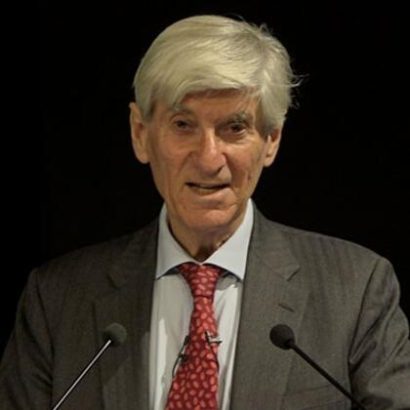Sir Vernon Bogdanor is Professor of Government, King’s College London and a member of the International Advisory Council of the Israel Democracy Institute. His most recent book is The Strange Survival of Liberal Britain.
I
Israel is a puzzle for political science. In theory, it ought not to exist as a stable democracy. It is indeed the only new state amongst twenty-one identified by the political scientist, Arend Lijphart, in his standard work, Democracies, that has remained continuously democratic since the late 1940s. Yet most Israelis come from countries such as Russia, Morocco, Iraq and Yemen whose attachment to democracy has historically been nearly non-existent. Israel, moreover, was founded under extremely adverse conditions – massive immigration, severe dislocation, considerable ethnic, cultural and linguistic diversity and, above all, a continuous security threat – indeed a threat to its existence such as has faced hardly any other state in the world.
Israel’s democratic ethos had been fashioned long before the state was created. At the first Zionist Congress which met at Basle in 1897, the Executive was elected by the Congress, a precedent that has always been followed in the Zionist movement. Women contributing the shekel were represented and although, at the first Congress, they could not vote, they were given full voting rights and the right to stand for office at the second in 1898, eight years before women won the vote in any European country.
II
Israeli democracy still bears many of the hallmarks of its origins in the Diaspora in two particular respects.
Electoral Reform
The first feature carried over from the Diaspora was the electoral system. Just as it was difficult for the infant state to give much thought to a constitution amidst the myriad of other problems which it faced, so also, it could not give much consideration to the appropriate electoral system. Therefore it was decided that elections to the Constituent Assembly, which became the First Knesset, should be held by the same method as had been used in the prestate period for elections to the Zionist Congress and in elections to the assemblies of the Yishuv, the Jewish Community of Mandatory Palestine. Membership of these bodies had been, of course, voluntary, there being no Jewish state to require allegiance. In the Zionist movement, it was thought to be vital to ensure that every strand of opinion was properly represented. No significant strand of Zionist thought should be excluded. Therefore an extreme form of proportional representation was adopted, a system more attuned to a voluntary organisation than to a modern state.
The principles of the Israeli electoral system are laid out in Article 4 of the Basic Law: The Knesset, which provides that the Knesset is to be elected in direct, nationwide and proportional elections. This Article is one of just two which requires more than a simple majority to be amended. It can only be amended by an absolute majority of the Knesset, i.e. 61 out of 120 votes, at all stages of the legislative process. The only other entrenched provision is Article 44 which requires that amending a statute by emergency regulation requires a majority of 80 out of 120 votes.
Under the Israeli system, the entire country serves as one national constituency and any party which can secure 3.25 per cent of the vote – the original threshold was just 1 per cent – gains representation. Voting is for ordered party lists not individuals, and candidates on any given list are elected on the basis of the order in which they appear on the list. Several parties, however, now have primary elections to determine the order of the lists, although only party members can participate in such elections.
Israel is one of a very small number of democracies to base its electoral system on a single national constituency. Part of the reason is that at a time when it was not clear what the final borders of the state would be, it was hardly possible to draw up local constituencies.
The assumption, however, was that this rigid electoral system would only be used for the first elections, and then reformed. But of course many of the parties, and in particular the smaller parties, which had secured representation under this system had a vested interest in it. So there has never been fundamental reform – a good illustration of the French proverb – c’est seulement le provisoire qui dure (it is only the temporary that lasts). But there is a sense in which no one really chose the Israeli electoral system.
The Israeli system is in a sense one of the fairest in the world since it allows every significant interest to secure representation. But most Israelis probably now favour reform. Perhaps Israelis tend to blame the electoral system for defects which are really a consequence of Israel’s deeply divided society. Nevertheless, there is a strong case for reform. For the system gives representation to a large number of very small parties. In the last election in 2022, 14 parties won representation in the Knesset, but only two – Likud and Yair Lapid’s Yesh Atid – secured over 10 per cent of the vote. Since no party has ever enjoyed an absolute majority of seats since the state was founded, all governments are coalitions. But the composition of these coalitions is determined not by the voters but by party leaders after the votes have been counted. In 2009, Tzipi Livni’s Kadima party gained the most votes, but through adroit manoeuvering, Binyamin Netanyahu of Likud was able to secure the premiership. And in recent years elections have led to deadlock such that between 2019 and 2022 Israel endured no fewer than five general elections.
Ben-Gurion favoured the British first past the post system to create stable and responsible government and, above all, a sense of statehood – mamlachtiyut – amongst a hitherto dispersed people. It is hardly coincidental that such a system would probably have given Mapai, the largest party, an absolute majority in the Knesset and an almost complete monopoly of power. In Britain in 2019 the Conservatives won a landslide in the British general election on just 43 per cent of the votes, nearly three-fifths of the voters having supported other parties. It was fears of a similar sort of outcome in Israel which helped persuade the first Knesset to require an absolute majority for altering the system rather than merely a relative majority.
The first past the post system, used in Britain, has a further defect in addition to converting a relative majority into an absolute one. It also fails to give accurate representation to significant minorities. In the 2015 general election in Britain, the United Kingdom Independence Party which advocated British withdrawal from the European Union secured 12.6 per cent – one eighth – of the vote, but just one seat in a House of Commons comprising 650 MPs. In Scotland, by contrast, the Scottish National Party gained 56 of the 59 seats on just 50 per cent of the Scottish vote. The Unionist parties gained just three seats on 50 per cent of the Scottish vote!
Israel obviously needs an electoral system which reflects its diversity rather than distorting it. So the British first past the post system could hardly work in Israel. It works best when there are only two major parties, as in Britain in 1950s and 1960s when over 90 per cent of the voters supported either the Conservatives or Labour. In a multi-party system, however, such as exists in Israel, the relationship between votes and seats under first past the post is unpredictable. The number of seats a party wins will depend not only on how many votes it secures but also on the structure of its vote. A party whose votes are concentrated will secure more seats for a given vote than a party whose votes are spread evenly across the country. For example, in Britain’s general election of 1983, the Labour Party gained 27 per cent of the vote while the Liberal/SDP Alliance of the vote secured just 2 per cent fewer votes – 25 per cent. Yet Labour secured 209 seats while the Alliance secured only 23. Labour’s vote was heavily concentrated in working class areas, while the vote for the Alliance was spread fairly evenly across the country. It came second in a large number of constituencies but first in very few.
Further, first past the post cannot work well in a segmented or `tribal’ society such as Israel. That has been shown in Northern Ireland, a society divided between Catholics and Protestants. In the period between 1921 and 1972, when the Northern Ireland Parliament was elected by first past the past, the Unionists, mainly Protestants, enjoyed a permanent majority since they then constituted around two thirds of the population of the province. There was hardly any floating vote prepared to switch to the Nationalists, who were predominantly Catholic. The outcome was widespread discrimination against Catholics in housing and employment. Israeli society is, like that in Northern Ireland, highly segmented, divided not so much by social class, as by religious observance and ethnicity.
So any reform in Israel should preserve the basic principle of proportional representation. Nevertheless, reform is clearly needed. There needs to be a constituency system so as to secure a closer relationship between members of the Knesset and the voters. For, in consequence of there being just one national constituency, there is less contact between members of the legislature and voters in Israel than in almost every other democracy; and, by contrast with British MPs and members of Congress in the United States, members of the Knesset are not well placed to act as mediators between the aggrieved citizen and the often-cumbrous Israeli bureaucracy.
Many Israelis look with favour at the German electoral system, under which the elector has two votes, one for a closed regional list, but another for a single-member constituency member, elected by first past the post. It is the total votes for the party list, subject to a national threshold – currently 5 per cent in Germany – which determines a party’s level of representation in the Bundestag. Britain has adopted variants of this system for subordinate bodies such as the Scottish Parliament, the Welsh Senedd and the London Assembly.
But this system too would not be suitable for Israel. It would do little to constrain the power of the party machine drawing up party lists; and, given the fragmentation of Israeli society and the large number of political parties, constituency MKs would probably represent only a minority of their constituents. The need in Israel is to open up the system, not to constrain it.
For this reason, Israel should consider adopting a proportional representation system with multi-member constituencies as in the Scandinavian democracies. To achieve full proportionality, such systems can be supplemented by `topping up’ i.e. adding a few members from a national list for under-represented parties which surmount the national threshold – 2 per cent in Denmark, 4 per cent in Sweden.
These systems have the advantage that constituencies can follow natural or established boundaries. Israel could be divided into 14 constituencies, reflecting already established communities. Tel Aviv might be one constituency returning perhaps 10 members and Haifa a single constituency returning perhaps 6 members. No special provision for boundary drawing is necessary. When population increases or decreases, there is no need to alter boundaries, but merely to increase or decrease the number of members returned in a particular constituency. This would remove fears held by some Israelis that a constituency system would encourage corruption or gerrymandering.
A multi-member constituency system would also weaken central party bureaucracies and allow for intra-party choice of candidate on the part of the voter. Constituency lists need not be ordered, but could simply group together the candidates of a party in alphabetical order, allowing the voters to choose which candidates they favoured, as, for example, in Finland’s open list system in which electors vote for one candidate from the party which they favour. So the general election is combined with a primary election in which all voters, not just party members, take part. And parties would have to present balanced lists. In a six member constituency, it would be no use presenting six secular Jewish males. To maximise a party’s vote, it would need to prevent a diversified and balanced ticket, in which all significant groups were represented. That would help to ensure a better balance between the various segments of Israeli society and between men and women.
The Arab minority would be particularly benefited with more effective local representation. Indeed, in areas where there was a strong Arab presence, candidates might compete with each other on the issue of who is best placed to secure economic resources for Arab towns and villages.
Finally, a constituency system could serve to humanise the bureaucracy. Constituency MKs could become intermediaries between the voter and the administration, constituency advocates when citizens are in dispute with the bureaucracy or welfare authorities. That would improve citizen efficacy.
Israel’s closed political system worked well during the early years of the state since the founding fathers, and the Labour/Zionist leadership and institutions enjoyed great prestige and authority. But as a more individualistic ethic has come to replace the socialism of the early days, reform is needed.
Electoral reform, however, is far from being a cure-all. Proportional representation, after all, is a transparent electoral system. The outcome will, as with a mirror, reflect Israeli society. If one does not like what one sees reflected, it is pointless to blame the mirror.
III
The Court: Supreme?
The second aspect of the Israeli political system carried over from the diaspora was the absence of those checks and balances which are present in most democratic systems, though not, it must be said, in Britain. Such checks and balances seemed unnecessary in the Zionist Executive when all were agreed on a single common goal, even though they might differ on the best means of getting there.
Israel remains one of just three democracies, together with Britain and New Zealand, without a constitution. The first Knesset, elected in 1949 was intended to be a Constituent Assembly, but no constitution was ever produced. The infant state was, after all, just recovering from war with its Arab neighbours and was hardly able to devote much time to constitutional matters. And a constitution would have raised the thorny question of the role of religion in the new state. Israel’s first Prime Minister, David Ben-Gurion, was a secularist, but his first government rested on a coalition with two religious parties, the United Religious Front and the Sephardi and Religious Communities. Arguing about the place of religion in the constitution could have disrupted the coalition. And no doubt there was also a political motive on Ben-Gurion’s part. His Mapai party – roughly similar to Britain’s Labour Party – was by far the largest party, but it did not enjoy an overall majority. Ben-Gurion, however, hoped that Mapai could eventually attain such an overall majority. If it did, a constitution with checks and balances would only hamper him. He admired the British system which was characterised in the 1970s by the Conservative Lord Chancellor, Lord Hailsham, as one of `elective dictatorship’. While there are calls even in Britain for a constitution, that is perhaps less necessary in a predominantly consensual society than in a society with ethnic, cultural and religious tensions such as Israel.
Israel, however, has a series of Basic Laws which were intended to lead eventually to a constitution. When, in 1992, the Knesset passed the Basic Law: Human Dignity and Liberty, guaranteeing basic civil liberties, the then Supreme Court President, Aharon Barak, declared that Israel was `now bound by fundamental human rights. No longer can it be claimed that Israel has no (formal and rigid) “written constitution” regarding human rights. The new legislation has taken Israel out of its isolation and placed it in the larger community of nations in which human rights are anchored in a “written and rigid” constitution, or in other words, in a document of normative supremacy or normative superiority’.[1] In 1995, in the landmark case United Mizrahi Bank v Migdal Cooperative Village, the Supreme Court for the first time annulled a law passed by the Knesset on the grounds that it contravened the Basic Law: Human Dignity and Liberty.
It would seem, therefore, that a Basic Law can be entrenched against limitation or repeal by the Knesset. But could a Basic Law, like the others, itself be amended or repealed by a simple majority in the Knesset in an illiberal direction? Until this month, the answer would have been uncertain. But the Supreme Court has just decided that it cannot.
The Netanyahu government has proposed highly controversial reforms to the Basic Law; The Judiciary. Its proposals led to massive and repeated demonstrations in the streets, demonstrations which ended only when Israel had to face the larger crisis posed by the Hamas atrocities of 7 October.
The Supreme Court has just decided by a majority of 12 to 3 that it has the right to strike down a Basic Law or amendment to a Basic Law. By a smaller majority of 8 to 7, it made the landmark decision to strike down an amendment to the Basic Law: The Judiciary which proposed to bar the courts from annulling governmental or ministerial decisions on grounds of ‘unreasonableness’. (Four of the seven dissenters accepted that the Supreme Court had the power of judicial scrutiny but believed that it should not be exercised in this case to disapply the legislation of the Knesset.) The Knesset, Supreme Court president Esther Hayut declared, had no constitutional authority to legislate a Basic Law or amendment to a Basic Law which would undermine Israel’s democratic or Jewish character. This legislation in her view damaged the separation of powers and the rule of law, both fundamental principles of the state. It is then now clear that the Knesset does not, as had previously been thought, enjoy unlimited power, but that all legislation, including Basic Laws, are subject to judicial review.
Ministers have reacted with fury to the law and it could lead to a constitutional crisis in Israel were the government, supported by the Knesset, and perhaps part of the population, to refuse to accept the jurisdiction of the Court. Such crises are, of course, not unknown in democracies, particularly in the United States. Indeed in 1857, the Dred Scott judgment, which declared that an escaped slave, not being a citizen of the United States, had no right to constitutional protection, ignited the process which led to the Civil War.
Interestingly, judicial review is in neither the American nor the French constitution of the Fifth Republic, but was in each case, as in Israel, a power which the courts assumed shortly after the constitutions were enacted – in the United States in the landmark case of Marbury v Madison in 1803, 16 years after the constitution was enacted – in France in 1971, 13 years after the constitution was enacted, when the Conseil Constitutionel annulled provisions relating to private non-profit organisations which, so it believed, illegitimately restricted freedom of association.
The decision of the Court on the issue of reasonableness is likely to have momentous consequences. It takes Israel a further step towards a constitution, since it makes it even clearer than before that the Knesset does not enjoy unlimited power and that there are matters on which even a majority in the Knesset cannot legislate.
IV
Towards an Israeli Constitution
Many Israelis believe that Israel needs a constitution. Some believe that the current crisis over judicial reform could prove a constitutional moment. I earn my living writing about constitutions, but one should not exaggerate what they can achieve. Germany’s Weimar constitution of 1919 had every device that liberals or social democrats could wish for – proportional representation, a bicameral parliament, federalism and judicial review of legislation. Yet it proved impotent before the determined assault of Hitler and the Nazi Party.
A constitution would not of itself do much to resolve Israel’s problems. For Israeli society, as pointed out by the then President Rivlin in a speech to the Annual Herzliya Conference in 2015 is `undergoing a far-reaching transformation’, such that it no longer enjoyed, as it had in the earlier years of the state, an overwhelming Zionist majority. Instead, Israel was composed of four ‘tribes’ of not dissimilar strength – secular Jews, national religious Jews, haredim and Arabs – tribes with entirely different outlooks `regarding the basic values and desired character’ of the state.
Some in each tribe wish that the other tribe were not there, seeing it as a `threat’ or a `danger’. Some in the national religious and haredi camps wish secular Jews or the Arabs were not there. Some secular Jews wish that the haredim were not there.
But the truth is that all four tribes are in Israel permanently and democracy will only work if all learn to live together. If Israel is to become a more stable democracy, she must, as President Rivlin implied, reform her political system so that all of her tribes feel at home in the state and can participate in decision-making.
Some European countries have faced a similar problem, most notably Switzerland which, until the mid-19th century, was the Ulster of Europe and endured a civil war in 1848. But her people then developed a genius for defusing tensions so that Catholics and Protestants, French, Germans and Italians can all live together peaceably. It is Switzerland’s consociational democracy in which all her `tribes’ enjoy a share of power that has enabled this to happen. Israel badly needs to develop a consociational system of her own in which all the tribes are able to share in government. Only then will all of the tribes feel secure enough to live together peacefully and amicably.
[1] Aharon Barak, `The Constitutional Revolution; Protected Human Rights’, quoted in p. 30 of Suzie Navot, The Constitution of Israel, Hart 2014, p. 30.





































